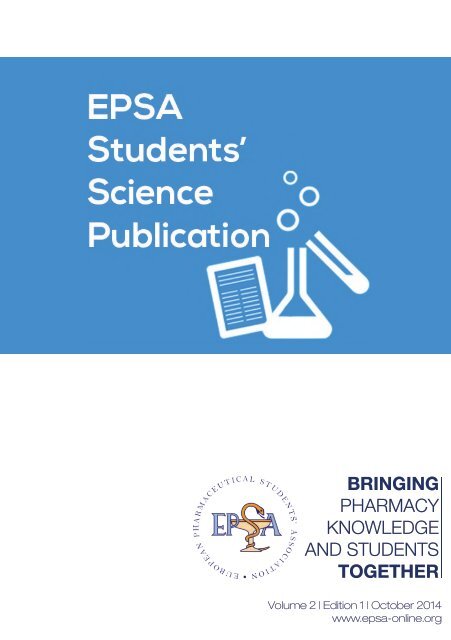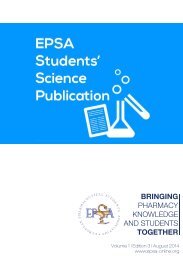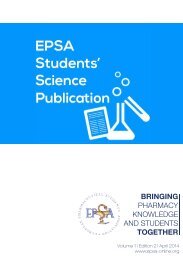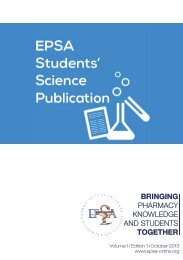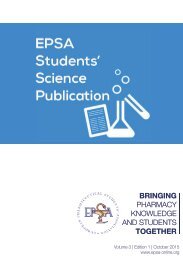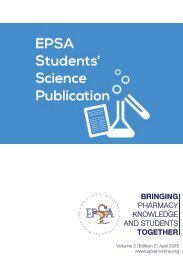essp04
You also want an ePaper? Increase the reach of your titles
YUMPU automatically turns print PDFs into web optimized ePapers that Google loves.
Bringing<br />
pharmacy<br />
knowledge<br />
and students<br />
together<br />
Volume 2 | Edition 1 | October 2014<br />
www.epsa-online.org
EPSA Students' Science Publication<br />
Dear friends,<br />
INTRODUCTION<br />
After a successful first year of the ESSP (EPSA Students’ Science Publication),<br />
we will now do the kick off for the second round!<br />
The aim of the ESSP is to give students, who have performed scientific<br />
research during their studies, the possibility to publish their abstracts. With the<br />
professional support of the European Federation for Pharmaceutical Sciences<br />
(EUFEPS), students get the opportunity to develop a new skill by learning how<br />
to write an abstract and how to critically analyse their own results.<br />
We are happy to present you 4 very interesting abstracts dealing with various<br />
topics such as: ‘Creation and Dissemination of a Two-Three-Dimensional<br />
Molecular Database for Drugs Targeting the Ears, Nose and Oropharynx’,<br />
‘Studies regarding the protective effects demonstrated by some anti-Alzheimer<br />
molecules on endothelial cells’, ‘The views, opinions and experiences of Zagreb<br />
pharmacists about generic drugs’ and ‘Self-medication with herbal products<br />
on the territory of Novi Sad’.<br />
Janice: ‘I had the amazing opportunity of cooperating with the last Edition<br />
(Volume 1) together with Rebwar Saleh, Science Coordinator 2013-2014. It<br />
gave me a good idea about the strengths and limitations of the process and<br />
I have tried to use this knowledge in this edition. I found it amazing to work<br />
together with the professional body of EUFEPS, whose contact person Per<br />
Öhrngren has been very motivating and helpful. On the other hand it was an<br />
honour to guide our students through this process and to feel their appreciation.<br />
In the end, this publication is all about learning and developing a new skill, and<br />
I am happy to be a part of that.’<br />
Yours in EPSA,<br />
Janice Geers, Science Coordinator 2014-2015<br />
2
Table of content<br />
Volume 2 | Edition 1 | October 2014<br />
Creation and Dissemination of a Two-Three-Dimensional Molecular<br />
Database for Drugs Targeting the Ears, Nose and Oropharynx.<br />
A. Spiteri, C. Shoemake, L. Azzopardi ...................................... 4<br />
Q&A of the author ........................................................................... 5<br />
Studies regarding the protective effects exerted by some anti-<br />
Alzheimer molecules on endothelial cells.<br />
A. C. Bogzeanu ......................................................................... 6<br />
Q&A of the author ........................................................................... 7<br />
The views, opinions and experiences of Zagreb pharmacists about<br />
generic drugs.<br />
J. Kurija, Ž. Juričić ..................................................................... 8<br />
Q&A of the author ........................................................................... 9<br />
Self-medication with herbal products on the territory of Novi Sad.<br />
N. Radović, J. Jakšić ................... ............................................10<br />
Q&A of the author ......................................................................... 11<br />
EUFEPS information ..................................................................... 13<br />
3
EPSA Students' Science Publication<br />
Creation and Dissemination of a Two-<br />
Three-Dimensional Molecular Database<br />
for Drugs Targeting the Ears, Nose and<br />
Oropharynx<br />
Abigail Spiteri, C. Shoemake, L. Azzopardi<br />
Department of Pharmacy, Faculty of Medicine and Surgery, University of Malta,<br />
Msida, Malta<br />
A 2- and 3-D structural database was created and evaluated to supplement<br />
lectures in medicinal chemistry and to merge clinical and structural molecular<br />
data of drugs targeting the ears, nose and oropharynx.<br />
The drugs considered were taken from Chapter 12 of the 66 th edition of the BNF 1<br />
and the MMH 2 . A datasheet with clinical and structural information about each<br />
drug was created. It was merged together with the 2- and 3-D images of the<br />
drugs into a database which was uploaded onto the Department of Pharmacy,<br />
University of Malta’s website. A questionnaire based on a template 3 , consisting<br />
of clinical and structural questions based on the molecules present in the<br />
database, was designed and validated. The dissemination of the questionnaire<br />
to the students in the first 4 years of the pharmacy course occurred in 2<br />
phases: as Pre-Test without utilising the database and as Post-Test while<br />
having access to the database. A group of randomly selected students from<br />
each year acted as the control group by filling in the questionnaire at both<br />
stages without having access to the database.<br />
101 students participated in the study, of which 43 were acting as the control<br />
group. The mean marks obtained during the Pre-Test were 4.17, 11.67, 13<br />
and 12.52, out of a maximum of 41, for the 4 years respectively. These marks<br />
improved during the Post-Test with averages of 25.17, 36.56, 33.71 and 35.1<br />
for the 4 years respectively. The Post-Test scores of the experimental group<br />
significantly surpassed those achieved in the Pre-Test (with a p-value < 0.001).<br />
For the control group the difference in scores between the Pre- and Post-Test<br />
was not significant (p value > 0.05). Of all students, 93% conceded that this<br />
tool would aid them during the studies.<br />
The incorporation of graphical representations of molecular structures had a<br />
positive effect on the students’ ability to perform in the questionnaire implying<br />
a better understanding of the chemical structure and the relevant application.<br />
This makes a case for the inclusion of databases such as the one created in<br />
this study as adjuncts to typically used didactic methods.<br />
1. British Medical Association/Royal Pharmaceutical Association of Great Britain. BNF 66.<br />
UK(London): BMJ Publishing Group Ltd/RPS Publishing; 2013<br />
2. Corso D. Evaluation of a Formulary for Non-British National Formulary Cited Items [Dissertaion].<br />
University of Malta; 2013<br />
3. Doublet Meagher L. Framework for the Compilation of a Two/Three-Dimensional Molecular<br />
Database [Dissertation]. Department of Pharmacy, University of Malta; 2012<br />
4
Q&A of the author<br />
General information about Abigail Spiteri<br />
Age: 22<br />
City and country: San Gwann, Malta<br />
E-mail address: abi.spiteri@gmail.com<br />
University: Faculty of Medicine and Surgery,<br />
University of Malta<br />
Volume 2 | Edition 1 | October 2014<br />
Why did you select this topic for your research?<br />
The field of education has always been a passion of mine.<br />
This study offered me the opportunity to analyse the<br />
benefit of supplementing didactic lectures with an interactive database and to<br />
see the effect of molecular visualisations on students’ understanding.<br />
How do you feel about having coped with the challenges that research can<br />
bring?<br />
This study necessitated a lot of cooperation from the student body by means of<br />
questionnaires. This project was being run within the Department of Pharmacy<br />
together with other projects carried out by my colleagues, which created a<br />
sense of student fatigue. When conducting such research, which requires the<br />
participation of volunteers, one has to be able to adapt and be practical. For<br />
this reason it was chosen to use a two-phased rather than a three-phased<br />
questionnaire.<br />
What personal skills did you develop as a researcher during your research<br />
period?<br />
Statistical analysis was never my forte and this turned out to be the main<br />
outcome measurement for my study. Thus I feel a sense of achievement at<br />
having successfully evaluated my results. On a more personal note I find that<br />
patience is a very valuable tool and one that you need in spades, especially<br />
when dealing with busy students.<br />
Would you like to share anything else with the students in Europe? Any<br />
recommendations?<br />
My main advice would be to not give up. Cheesy, I know, but it does not detract<br />
from the certainty that at some point or another you just feel like throwing the<br />
towel in and saying “I've had enough”. Keep in mind all the years of study that<br />
you have gone through to arrive where you are now and know that it does all<br />
come together in the end. And it feels great when it does. Good luck to all of<br />
you students and future colleagues.<br />
5
EPSA Students' Science Publication<br />
Studies regarding the protective<br />
effects exerted by some anti-Alzheimer<br />
molecules on endothelial cells<br />
Alexandra Cătălina Bogzeanu coordinated by PhD. Denisa Margină,<br />
Biochemistry Department, Faculty of Pharmacy, University of Medicine and Pharmacy,<br />
Bucharest, Romania<br />
Alzheimer’s disease (AD) is one of the most frequent neurodegenerative<br />
disorders. Cholinesterase inhibitors (AChE) such as rivastigmin and donepezil<br />
and the partial NMDA receptor antagonist (memantine) are currently used as<br />
treatment for AD. In the synaptic gap between the affected neurons there is<br />
a constant hypersecretion of glutamate which leads to an excessive calcium<br />
uptake in the existing channels of NMDARs. The postsynaptic membrane is<br />
always depolarized and has an impaired function.<br />
Recent studies suggest that effects of AChE inhibitors are not limited to<br />
their cholinergic activity; other mechanisms including inhibition of glutamate<br />
excitotoxicity, thereby reducing inflammatory processes, have been proposed<br />
as ways of action. Prolonged and sustained inflammation may have cytotoxic<br />
effects. MCPs (produced during inflammation) are associated to neuronal<br />
death.<br />
The aim of this study was to reveal the effect induced by donepezil, rivastigmine<br />
and memantine on the LDH activity (indicating the membrane damage), on<br />
the susceptibility of membrane cells to lipid peroxidation and on the MCP-1<br />
synthesis, using EaHy96 endothelial cells as study model.<br />
Cells were treated with rivastigmine, memantine and donepezil using 10 µM,<br />
20 µM and 50 µM concentrations. The LDH assay was performed based on<br />
the kinetic UV evaluation of NADH transformation (in the process of oxidizing<br />
lactate to pyruvate).<br />
For the assessment of the lipid susceptibility to peroxidation DPPP was used, a<br />
probe that lacks fluorescence but has high affinity for lipids. DPPP labelled cells<br />
were treated with CuOOH to induce DPPP-oxide formation (highly fluorescent<br />
compound). The process was assayed by performing a fluorescence emission<br />
spectrum. The ELISA method was used for detecting the MCP-1 synthesis.<br />
Results: The three substances do not significantly reduce the LDH activity,<br />
having a protective effect on the mitochondrial metabolism. The three tested<br />
substances do not influence the susceptibility to lipid peroxidation which<br />
means the three substances do not modify the redox equilibrium and thereby<br />
do not act as antioxidants. Also, the study demonstrated that they have the<br />
ability to reduce MCP-1 synthesis, memantine being the one with the most<br />
powerful effect and reduction was seen with all tested concentrations.<br />
Conclusion: The three tested drugs have a protective effect and do not induce<br />
cellular death. This effect can be interpreted in correlation with the cardiovascular<br />
disease, which appears especially at elderly.<br />
6
Q&A of the author<br />
General information about Alexandra Cătălina Bogzeanu<br />
Age: 22<br />
City and country: Bucharest, Romania<br />
E-mail address: alle.caty@gmail.com<br />
University: Faculty of Pharmacy, University of Medicine<br />
and Pharmacy<br />
Volume 2 | Edition 1 | October 2014<br />
Why did you select this topic for your research?<br />
During my studies I have often been impressed by scientists'<br />
achievements and their will to treat various diseases. I<br />
started my research in cooperation with the Biochemistry Department in the<br />
Faculty of Pharmacy at the University of Medicine and Pharmacy, Carol Davila.<br />
Alzheimer’s disease (AD) is one of the most frequently diagnosed<br />
neurodegenerative disorders and is the most common cause of dementia in<br />
modern society. Therefore, it is essential that we know the right medication to<br />
use and the drugs effect on the entire body.<br />
How do you feel about having coped with the challenges that research can<br />
bring?<br />
The topic is very interesting and complex. I enjoyed the opportunity to work with<br />
Dr. Denisa Margină (Associate Professor, Biochemistry Department, Faculty of<br />
Pharmacy, University of Medicine and Pharmacy), a renowned expert and a<br />
very good professor. I read a lot about AD and I really hope that I`ll do more<br />
research in this area.<br />
What personal skills did you develop as a researcher during your research<br />
period?<br />
During my research period, I learned that I must become more confident and<br />
more precise. I also learned how an experiment is really done and how to<br />
rationally analyze problems and results.<br />
Would you like to share anything else with the students in Europe? Any<br />
recommendations?<br />
If there is something that you are really interested in or if you just want to<br />
discover something, don't give up and don't waste time. Hard work, confidence<br />
and joy are the right formula for a great life and they make dreams come true.<br />
7
EPSA Students' Science Publication<br />
The views, opinions and experiences<br />
of Zagreb pharmacists about generic<br />
drugs<br />
Jelena Kurija, Živka Juričić<br />
Faculty of Pharmacy and Biochemistry, University of Zagreb, Zagreb, Croatia<br />
Generic drugs are drugs which are an equivalent substitution for the original<br />
drug, not only because they contain the same amount of active substance and<br />
are used in the same way, but also because they have to meet the criteria of<br />
bioequivalence and bioavailability, which indicates their high efficacy.<br />
The aim of the study was to question attitudes, opinions and experiences of<br />
the pharmacists in the city of Zagreb concerning generic substitution: what<br />
do the pharmacists believe to be the main problems? This research should<br />
contribute to an additional understanding of generic substitution and, by using<br />
an appropriate method, involve the pharmacists as relevant subjects, in order<br />
for therapy to secure optimal therapeutic effect.<br />
The paper is based on a questionnaire regarding the topic which has been<br />
filled out by pharmacists. Exactly 80 valid questionnaires have been collected<br />
and statistically processed in Excel.<br />
Questioned pharmacists expressed great scepticism at the usage of generic<br />
drugs, not due to the efficacy of active substance, but due to excipients,<br />
insufficient amount of clinical trials, the influence of generic companies and<br />
Croatian Health Insurance Fund on the policy of prescribing generic drugs.<br />
The pharmacists questioned believe that they have knowledge and know all<br />
legal regulations and key attributes of generic drugs very well. However, they<br />
very much welcome additional knowledge. Moreover, in their opinion, they<br />
should be guided by scientific and specialized literature in everyday practical<br />
work. There is only a small amount of collaboration between doctors and<br />
pharmacists, especially when it comes to generic substitution.<br />
Most of the individuals that were questioned believe that patients do not know<br />
their legal right to decline generic substitutions. Results of the study show<br />
that pharmacists believe that the patients should be informed about the most<br />
important aspects of generic drugs, so they are aware that different external<br />
characteristics do not necessarily result in changes in the efficacy and adverse<br />
effects of the drug. An emphasis should be especially put on additional<br />
education of pharmacists, since they are the constituent part of primary health<br />
protection. The college they studied at should be included in their additional<br />
education and congresses should be organized on the topic of generic drugs<br />
and innovation, so that pharmacists can be continually educated and pursue<br />
professional development during their career. After all, every idea, opinion and<br />
attitude of academic citizens is based on their basic knowledge.<br />
8
Q&A of the author<br />
General information about Jelena Kurija<br />
Age: 20<br />
City and country: Zagreb, The Republic of Croatia.<br />
Email address: jkurija@hotmail.com<br />
University: Faculty of Pharmacy and Medical Biochemistry,<br />
University of Zagreb<br />
Volume 2 | Edition 1 | October 2014<br />
Why did you select this topic for your research?<br />
I found this subject to be quite interesting but firstly, up<br />
to date. Doctors, pharmacists and patients have different<br />
opinions about generic drugs and generic substitution so I decided to find out<br />
as much as I could about at least one of these opinions.<br />
How do you feel about having coped with the challenges that research can<br />
bring?<br />
There are always both negative and positive comments about any work and<br />
everyone should be prepared for them. I strongly feel that pharmacists' opinions<br />
do matter and that their thinking actually represents the patients because<br />
pharmacists are one of the few healthcare professionals directly connected<br />
with patients. Therefore, I strongly stand by my work because it shows us the<br />
real experience among those who deal with generics on a daily basis.<br />
What personal skills did you develop as a researcher during your research<br />
period?<br />
I developed flexibility, accuracy and industriousness.<br />
Would you like to share anything else with the students in Europe? Any<br />
recommendations?<br />
I highly recommend that everyone should conduct at least one research project<br />
of any kind during their college years. This improves countless skills and you<br />
could discover that you have what it takes to be a real scientist or researcher!<br />
9
EPSA Students' Science Publication<br />
SELF-MEDICATION WITH HERBAL PRODUCTS<br />
ON THE TERRITORY OF NOVI SAD<br />
Ninoslav Radović, Jelena Jakšić; supervisor: Assist. dr sc Svetlana Goločorbin-Kon<br />
Faculty of Medicine - Department of Pharmacy, University of Novi Sad, Novi Sad, Serbia<br />
Self-medication represents selection and use of traditional medicines, herbal<br />
remedies and products for medical conditions/symptoms that individuals<br />
are able to recognize themselves. Sales of herbal products rise every year,<br />
yet, the widespread attitude that any product which can be bought without<br />
a prescription is completely safe to use often leads to individuals’ adverse<br />
reactions. Therefore, we wanted to identify the frequency with which herbal<br />
products are used for medical treatment and which group of patients uses<br />
them most, most common indication, which gender prefers this type of<br />
treatment, primary source of information, monthly spending, as well as whether<br />
the participants in the survey were informed about the benefits and potential<br />
side effects of using herbal products. The survey was conducted among the<br />
patients in “The Novi Sad Pharmacy Institute”. The respondents were randomly<br />
selected, and the data, obtained from their responses to the questionnaire,<br />
were statistically analyzed.<br />
Of the 247 respondents, 27 (10.93%) responded that they did not use any<br />
herbal products, while 220 (89.07%) participants said that they have used<br />
herbal products. The percentage of female participants who decided to selfmedicate<br />
was 69.09%. In addition, 38.87% respondents belonged to the age<br />
groups 31-40 and 51-60. Their most common sources of information were<br />
friends and relatives (28.32%) and their dominant condition for using herbal<br />
products, as 37.04% of them indicated, was cold. Of the respondents, 27.73%<br />
used herbal products several times a year, but not weekly, while their monthly<br />
allocation was 1,00–5,00 EUR (49.55%). More than half, 55.16%, believe that<br />
herbal products are safer than conventional medicines. Furthermore, 87.73%<br />
read the instructions, and 55.91% said that they were capable to determine<br />
the indication for the use of a certain herbal remedy. Moreover, 62.27% felt<br />
that they were aware of a remedy’s adverse action, while 55.18% considered<br />
themselves insufficiently familiar with the interactions between herbal products<br />
and traditional medicines.<br />
Age groups of respondents who used herbal products, based on this study,<br />
are 31-40 and 51-60. The respondents considered themselves well-informed<br />
about the use of these products, although their primary source of information<br />
on herbal products listed friends and relatives rather than healthcare<br />
professionals. Respondents decided to self-medicate with herbal products<br />
so as to treat symptoms of cold, but some decided to treat serious medical<br />
conditions such as insomnia or depression. It is necessary to establish better<br />
communication between healthcare professionals and patients, in order to<br />
minimize the occurrence of potential adverse drug reactions and interactions.<br />
10
Q&A of the author<br />
General information about Ninoslav Radovic<br />
Age: 25<br />
City and country: Novi Sad, Republic of Serbia<br />
E-mail address: ninoslav.radovic@aol.com<br />
University: Faculty of Medicine, University of Novi Sad<br />
Volume 2 | Edition 1 | October 2014<br />
Why did you select this topic for your research?<br />
Herbal products have been used for thousands of years in<br />
the East and have had a recent resurgence in popularity<br />
among consumers in the West as part of self-medication.<br />
Self-medication has many advantages but it also has potential dangers,<br />
therefore it was interesting to identify the frequency with which herbal products<br />
are used for medical treatment and how informed the population of Novi Sad<br />
is regarding the usage of herbal products.<br />
How do you feel about having coped with the challenges that research can<br />
bring?<br />
Since this was one of the first studies about self-medication with herbal<br />
products in my town, challenges were numerous. Choosing the right topic and<br />
having the support of your team and your supervisor are the most important<br />
things during your research, especially if it is your first time doing it.<br />
What personal skills did you develop as a researcher during your research<br />
period?<br />
The survey was conducted among the patients in the Novi Sad Pharmacy<br />
Institute and I had a chance to communicate with patients in an informal way.<br />
This way I learned that patients think that they don’t get enough information<br />
from their pharmacist. Therefore, I’ll dedicate more energy to improving this<br />
communication in my future work.<br />
Would you like to share anything else with the students in Europe? Any<br />
recommendations?<br />
The most important thing is to choose a topic that will contribute to science<br />
and people’s health. Don’t be afraid of doing something that hasn’t been<br />
done before. Being part of a research team, or doing your own research is<br />
an experience that can give you countless opportunities for your future<br />
development.<br />
11
EPSA Students' Science Publication<br />
12
Volume 2 | Edition 1 | October 2014<br />
European Federation for<br />
Pharmaceutical Sciences (EUFEPS)<br />
The European Federation for Pharmaceutical Sciences is a voluntary<br />
association of pharmaceutical scientists, established in 1991 to advance<br />
research in the pharmaceutical sciences in Europe. This can be achieved by<br />
promoting cooperation between national, regional and European societies or<br />
associations which aim at the advancement of pharmaceutical sciences, and by<br />
promoting cooperation between and with other pharmaceutical organisations<br />
and between individual pharmaceutical scientists.<br />
The Mission<br />
EUFEPS exists to help to meet the challenges and seize the opportunities<br />
created by the consolidations occurring both within Europe and globally,<br />
driven on by a combination of rapid advances in science and technology,<br />
economic pressures, and by political will. Within this frame, EUFEPS’s role and<br />
contributions are amply expressed in its mission statement “EUFEPS serves<br />
and advances excellence in the pharmaceutical sciences and innovative drug<br />
research in Europe”. Spearheading a number of initiatives, EUFEPS works with<br />
its membership, throughout the nations of Europe.<br />
European Dimension<br />
EUFEPS is unique being the only pan-European organisation that represents,<br />
under one umbrella, all the pharmaceutical sciences and pharmaceutical<br />
scientists engaged in drug research and development, drug regulation and<br />
drug policy making. The existence of such an umbrella platform facilitates the<br />
highly innovative, integrative and interdisciplinary approaches that are essential<br />
if we, in Europe, are to deliver to our citizens safe, effective, economic and<br />
timely medicines. The ultimate benefits are an improving health, quality of life,<br />
and wealth of our continent.<br />
13
EPSA Students' Science Publication<br />
EUFEPS is recognised by the European Commission, as representing the<br />
integrative pharmaceutical sciences within Europe. EUEFPS is also recognised<br />
by the EMEA as a neutral scientific resource for independent opinions on draft<br />
regulatory guidelines, while EUFEPS works with other European organisations,<br />
such as EFPIA, to help identify and promote training to meet industrial<br />
needs. EUFEPS has the ambition to provide a forum for policy development<br />
in the pharmaceutical sciences, particularly in relations to the discovery and<br />
development of new drugs and their introduction into the market, but also as<br />
to medicines usage. This includes policies on and leadership development as<br />
to: research, education & training, profiling and regulatory affairs.<br />
In addition, EUFEPS plays an active and influential role also in the global arena.<br />
It is recognised by the USA FDA and it works actively with its sister organisation<br />
AAPS to develop co-sponsored meetings and workshops that run alternatively<br />
in Europe and the USA, and is developing links with Asian scientists. Through<br />
involvement with its Board of Pharmaceutical Sciences, EUFEPS is also<br />
working with FIP to advance the pharmaceutical sciences globally.<br />
14
Volume 2 | Edition 1 | October 2014<br />
Upcoming Conferences organised by EUFEPS:<br />
Global Bioequivalence Harmonisation<br />
Initiative<br />
February 2015<br />
For more information see: www.eufeps.org or www.gbhi.eu<br />
EuPAT7<br />
May 17-18, 2015, Graz, Austria<br />
organised by EUFEPS<br />
For more information see: www.qbdpat.org<br />
EUFEPS Annual Meeting 2015<br />
June 2015, Geneva, Switzerland<br />
For more information see www.eufeps.org<br />
6 th BBBB Conference on Pharmaceutical<br />
Science: “Strategies to improve the<br />
quality and performance of modern drug<br />
delivery systems”<br />
September 10-12, 2015, Helsinki, Finland<br />
For more information see www.eufeps.org<br />
15


